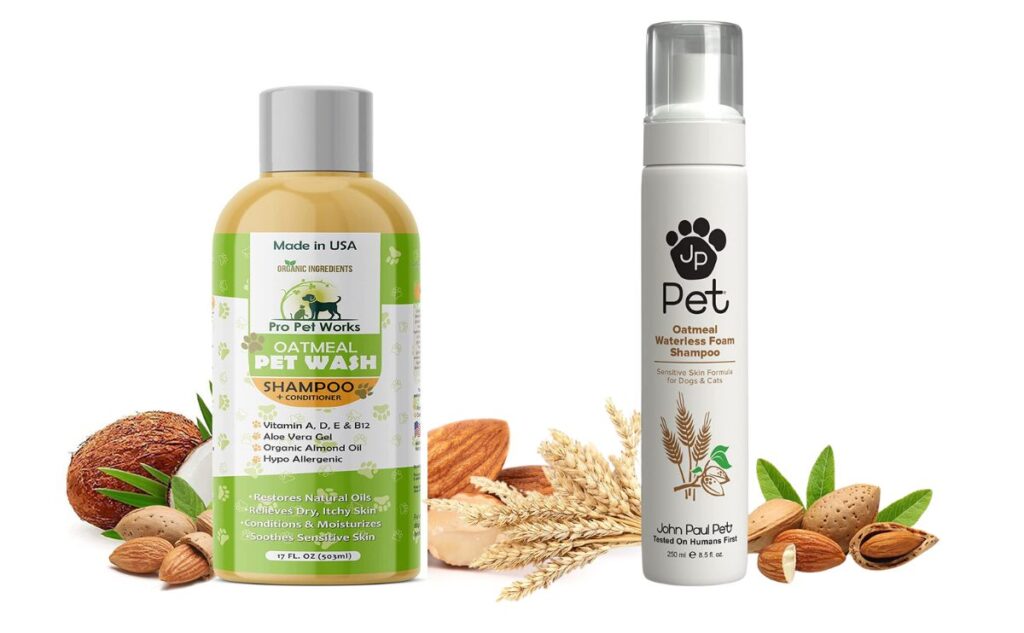Can Dogs Eat Almonds? Don’t Go Nuts Just Yet!
When you purchase through links on our site, we may earn a commission. Here’s how it works.

Almonds are the it-girl of the health food world—always in the spotlight and effortlessly alluring, with a chameleon-like ability to appear in everything from trail mix to your overpriced almond milk latte. But while almonds have secured their place in the human snack zeitgeist, what happens when your dog wants a taste? Can dogs eat almonds, or is this one human obsession best left to the two-legged crowd?
Table of Contents
It’s hard to resist those beguiling begging eyes that tell you, “Just one can’t hurt.” Worse, if your pooch pulls an “Ocean’s Eleven” on your snack stash, you need to know if you’re in for an emergency vet visit. Before you assume your dog is about to unlock the power of plant-based protein and fat, let’s crack open the truth—because when it comes to pups and almonds, things get a little… nutty.
Can Dogs Eat Almonds?

Almonds may be a healthy snack for humans, but they can cause serious digestive issues for dogs. Canine digestive systems aren’t built to process nuts efficiently, making it difficult for almonds to break down. As a result, dogs that consume almonds may experience stomach discomfort, bloating, and other unpleasant symptoms.
Watch for these symptoms if your dog eats almonds:
- Diarrhea: Loose stools can indicate that almonds irritate your dog’s digestive tract
- Gas: Digestive discomfort can lead to excessive bloating and flatulence
- Lethargy: If your dog seems unusually tired, it could be a sign of digestive distress
- Loss of appetite: An upset stomach may cause your dog to refuse food
- Upset stomach: Nausea, cramping, and discomfort are common after eating almonds
- Vomiting: Your dog’s body may try to expel the almonds if they cause irritation
Beyond digestive issues, almonds also pose a serious choking hazard, especially for smaller breeds. Their hard texture makes them difficult to chew, and whole almonds can easily become lodged in a dog’s throat or airway. If swallowed whole, they can also lead to dangerous intestinal blockages.
Another major concern? Seasoned or coated almonds. Many store-bought almonds come flavored with garlic, onion powder, or other seasonings that are toxic to dogs. Even small amounts of garlic and onion can damage red blood cells, leading to anemia. Chocolate-covered almonds are even more dangerous—chocolate is highly toxic to dogs and can cause vomiting, seizures, or even fatal reactions in severe cases.
Almonds are also high in fat and salt, which can cause weight gain and water retention over time. A high-fat diet increases the risk of pancreatitis, a painful and potentially life-threatening condition. Given these risks, it’s best to keep almonds out of your dog’s diet and stick to treats explicitly designed for their nutritional needs.
Are Almonds Toxic To Dogs?

No, almonds aren’t technically toxic to dogs—but that doesn’t mean they’re safe to eat. While plain almonds don’t contain poisonous compounds like other nuts (such as macadamia), they still pose several health risks.
One of the biggest concerns is seasoned almonds, which can introduce dangerous ingredients into your dog’s system. Many flavored almonds are coated in spices like jalapeño, sweet chili, or Sriracha, all of which can cause intense stomach upset, excessive thirst, and, in some cases, serious health complications. Even small amounts of spicy or highly seasoned foods can lead to digestive distress, vomiting, or even inflammation in the gastrointestinal tract.
Another hidden danger? Mold contamination. Some nuts, including almonds, are prone to developing Aspergillus mold, a fungus that produces harmful toxins. Dogs don’t even have to eat the moldy almonds to be affected—simply inhaling the mold spores can make them sick. Exposure to Aspergillus mold can lead to respiratory issues, triggering sneezing, reverse sneezing, nasal discharge, nasal pain, and even severe nosebleeds. In some cases, mold exposure can lead to lung infections or long-term allergic reactions, making contaminated almonds a serious risk.
Even if the almonds are plain and mold-free, their high-fat content can still lead to pancreatitis, a painful and potentially life-threatening condition in dogs. Over time, eating fatty foods like almonds can contribute to weight gain, digestive problems, and metabolic imbalances.
The bottom line? Almonds may not be toxic, but they aren’t a safe or healthy dog snack. Instead of taking the risk, opt for dog-friendly treats specifically formulated for their digestive systems.
What Should I Do If My Dog Eats Almonds?
If you suspect your dog ate an almond, keep a close eye on them for any signs of digestive distress. While one or two plain almonds (without seasoning or heavy salt) likely won’t cause serious harm, it’s still best to avoid them altogether. Even if your dog seems fine, almonds can be challenging to digest, and repeated exposure could lead to long-term health issues like pancreatitis. The safest approach? Make sure they don’t get the opportunity to snack on almonds again.
If, however, your dog managed to eat a large number of almonds in a short period, don’t wait—call your vet immediately for guidance. A handful of almonds can overwhelm their digestive system, leading to stomach pain, vomiting, diarrhea, or even a dangerous intestinal blockage. Small breeds, in particular, are at higher risk for choking and digestive complications, so it’s crucial to act quickly.
Did your dog consume a large quantity of almonds within the last 30 minutes? Your vet may recommend inducing vomiting to help remove the nuts before they cause further harm. Time is critical in these situations, so if you can’t reach your veterinarian, contact the Pet Poison Helpline at 1-855-764-7661 for expert advice.
You can also use our “Ask A Vet” feature to connect with a veterinary professional 24/7 and get real-time guidance on what steps to take next. When it comes to your dog’s health, it’s always better to be safe than sorry!
Can Dogs Be Allergic To Almonds?
Like humans, dogs can have food allergies or sensitivities, and almonds are no exception. While not as common as allergies to proteins like beef or chicken, some dogs may have an adverse reaction to almonds. If your dog is allergic, their immune system will treat almonds as a threat, triggering symptoms that range from mild irritation to severe reactions.
Signs of an almond allergy can include
- Coughing
- Difficulty breathing
- Excessive itching
- Hives
- Sneezing
- Swelling
In more serious cases, dogs may experience anaphylaxis, a life-threatening reaction that requires immediate veterinary attention.
If you suspect your dog has an almond allergy, call your vet immediately—especially if they show signs of respiratory distress, facial swelling, or severe itching. Even if the reaction seems mild, seeking professional advice is best to determine whether further treatment or allergy testing is needed. Some allergic reactions can worsen, so monitoring your dog closely after exposure is essential.
If it’s not an emergency, but you’re curious about whether your dog has food or environmental allergies, consider using an at-home dog allergy test. These tests analyze saliva or hair samples to identify potential allergens, helping you make informed decisions about your dog’s diet and environment. While they don’t replace a veterinary diagnosis, they can provide valuable insights into your dog’s sensitivities, allowing you to tailor their food and lifestyle choices to keep them comfortable and healthy.
Using Almond Oil For Your Dog’s Skin & Coat
Almonds aren’t just a snack—almond oil can also provide several benefits as a topical treatment. If your pup suffers from dry, itchy skin or cracked paws, almond oil can help soothe irritation and restore moisture. It’s lightweight, absorbs quickly, and is packed with vitamin E and essential fatty acids, which support skin health and hydration.
If your dog’s nose is dry or cracked, dabbing almond oil on the area can provide relief and protection. You can gently massage it into your dog’s coat to nourish the skin, reduce flakiness, and promote a healthy shine.
One of the most significant benefits of almond oil is its natural anti-inflammatory properties, which can help ease redness, minor rashes, and skin discomfort. If your dog experiences mild irritation from allergies or environmental factors, almond oil may provide a soothing barrier to help with healing.
Because it’s a natural, non-toxic moisturizer, almond oil is safe for dogs to lick off their fur in small amounts. However, if your dog shows any signs of discomfort, itching, or an allergic reaction, discontinue use and consult your vet.
Choosing The Right Almond Oil For Your Dog
When selecting an almond oil, always choose a pure, unscented variety free from additives, essential oils, or artificial fragrances. Some essential oils can be toxic to dogs, so it’s best to stick with 100% pure almond oil, like NOW’s almond oil, which is non-GMO and made in the USA. Learn more about essential oils for dogs.
If you’re trying almond oil for the first time, start with a small amount and observe how your dog reacts. If they lick it off, don’t worry—it’s completely safe in moderation. However, if your dog seems uncomfortable, develops skin irritation, or isn’t benefiting from the oil, stop using it and consult your vet for alternative solutions.
Frequently Asked Questions
Here are some frequently asked questions about dogs and almonds. Don’t see yours? Ask us in the comments.
What Happens If My Dog Eats An Almond?
If your dog eats one or two plain almonds, they will likely be fine, but monitoring them for any signs of distress is essential. Dogs digest nuts poorly, so even a small amount can cause stomach upset, bloating, or mild discomfort. Some dogs may also experience increased thirst due to the salt content in almonds.
However, if your dog eats multiple almonds or has a sensitive stomach, symptoms like vomiting, diarrhea, gas, or lethargy may develop. In small breeds, even a single almond poses a choking risk or the potential for an intestinal blockage if it isn’t properly chewed. If your dog begins showing signs of illness or distress after eating almonds, contact your veterinarian for guidance.
Can Dogs Eat Almond Butter?

Yes, dogs can eat almond butter in moderation. Plain almond butter is less risky than whole almonds because it eliminates the choking hazard and is easier to digest. Whole almonds are hard, dense, and difficult for dogs to chew properly, making them a serious risk for choking and intestinal blockages—especially for smaller breeds. When almonds are ground into a smooth butter, they lose that dangerous shape, reducing the chance of obstruction in the throat or digestive tract.
Additionally, almond butter is more digestible than whole almonds. Dogs struggle to break down the tough proteins and high-fat content found in whole nuts, often leading to gastrointestinal upset like bloating, gas, or diarrhea. Since almond butter is already processed into a paste, it’s easier on their digestive system when consumed in small amounts.
That said, not all almond butter is safe. Many store-bought varieties contain added sugar, salt, or xylitol, a sugar substitute that is highly toxic to dogs and can cause a dangerous drop in blood sugar, seizures, or even death.
If you choose to give your dog almond butter, it must be plain, unsweetened, and xylitol-free—and only as an occasional treat. We recommend Spread The Love Unsalted Almond Butter because it has no added sugars or salt and is made in the USA. Even safer alternatives include plain, unsweetened peanut butter or mashed banana, which offer a similar texture with fewer risks.
Can Dogs Drink Almond Milk?

Like almond butter, almond milk is safe in small quantities. But make sure to avoid sweetened almond milk because it contains unnecessary sugar that’s also high in fat and can lead to dental decay. Sweetened almond milk might also contain xylitol, which is toxic for dogs.
Can Dogs Have Almond Flour?
Yes, almond flour is a dog-safe alternative to traditional wheat flour, making it a great option for homemade dog treats—especially for dogs with wheat allergies or grain sensitivities. Unlike whole almonds, almond flour is finely ground and much easier for dogs to digest. It also retains many of the nutritional benefits of almonds, providing a source of protein, healthy fats, fiber, and essential vitamins like vitamin E and magnesium.
One of the most significant advantages of almond flour is its higher protein content and lower carbohydrate levels compared to traditional flour. This makes it a good choice for dogs who need a grain-free diet or those who thrive on higher-protein, lower-carb foods. However, because almond flour is naturally higher in fat than some other flour, it should still be used in moderation to prevent excessive fat intake, which can contribute to weight gain or pancreatitis in some dogs.
Are Any Nuts Safe For Dogs?
Most nuts should be avoided, but some are less harmful than others in moderation. Macadamia nuts are highly toxic and can cause neurological symptoms, while walnuts and pecans can grow mold that produces harmful toxins.
If you want to offer your dog a nut-based treat, plain, unsalted peanuts or cashews are the safest options—but only in crushed and in small amounts. Peanut butter is a favorite of many pups and is safe providing it does not contain xylitol. Plain pine nuts in small amounts are also safe.
Nuts and nut products are often high in calories and fats and should only be an occasional treat. Always double-check that they are unsalted and free from seasonings or additives like xylitol.
How Can I Prevent My Dog From Eating Almonds?
The best way to protect your dog from almonds is to keep them out of reach. Store nuts and nut-based products in sealed containers or cabinets your dog can’t access. Be mindful when snacking—if you drop an almond, pick it up right away before your dog gets to it.
Training commands like “leave it” or “drop it” can also prevent your dog from eating something they shouldn’t. If your dog is particularly food-driven, consider offering them a healthy, dog-safe alternative while you enjoy your almonds to keep them from begging or snatching your food.
What Are Some Safe Treat Alternatives To Almonds?
If you’re looking for a crunchy, nutritious treat for your dog, plenty of safe, dog-friendly options won’t risk their health. Some great alternatives include:
- Carrot sticks: Low in calories and great for dental health
- Apple slices (without seeds): A naturally sweet treat packed with fiber and vitamins
- Green beans: A low-calorie, crunchy snack that many dogs love
These options provide the crunch dogs love without the digestive risks that come with almonds. When in doubt, always stick to treats designed explicitly for canine nutrition to ensure your dog stays happy and healthy.
What Other Foods Can Dogs Eat?
While most nuts are a no-no, most veggies and fruits are on the safe side and excellent sources of vitamins and nutrients for dogs. But do you know which are safe? Be sure to educate yourself on which foods are and aren’t safe for dogs to eat and drink and what to do if your dog has an upset stomach.
Why Trust Canine Journal?
Sadie is a devoted pet parent to a charming Cavalier King Charles Spaniel with a food allergy. Navigating the challenges of managing her pup’s food sensitivities and dietary restrictions inspired Sadie to seek out the best treats that not only cater to her fur baby’s specific needs but also satisfy his taste buds. Sadie’s commitment to her pet’s happiness and health motivated her to carefully curate a wide selection of healthy dog treats to have on hand in her household. She has a deep understanding of the struggles faced by pet owners dealing with allergies.




